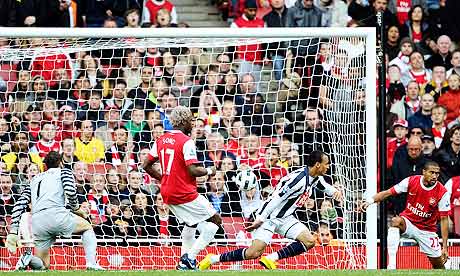Five things we learned from the Premier League this weekend
Posted Tuesday, September 28, 2010 by theguardian.com
The second-tier teams are catching up, and other thoughts from the weekend's Premier League action

West Bromwich Albion's Peter Odemwingie, second from right, puts his team 1-0 up against Arsenal at the Emirates.
1.This was a good weekend for the lowly, the second tier and those with an Ed Miliband-like belief in the progressive redistribution of footballing riches
Not only did all six English teams to have qualified for the Champions League in the past six years fail to win, there was further evidence of congealment – or at least retrenchment – among the playing stocks of Arsenal and Manchester United. After a period of restrained recruitment and a progressive shedding of key players, both Arsenal and United now lack what they had in previous seasons: an excess of the kind of high-quality players that can provide a winning moment of quality in the tightest of games. Wayne Rooney aside, United have no genuinely world-class attacking players. Two seasons ago Rooney and Dimitar Berbatov came as part of a revolving attacking package alongside Cristiano Ronaldo and Carlos Tevez. Arsenal simply look like a work in progress. With Andrei Arshavin muted and Cesc Fábregas out they too lack a decisive core of elite talent that has taken them away from mid-tier opponents in the past. It is possible, also, that Manchester City have given a clue as to how to play Chelsea. So far teams have been routinely baffled by the champions' use of mobile and athletic wide midfielders supported by attacking full-backs. Chelsea always find space and penetration on the flanks. But they didn't on Saturday as Roberto Mancini set his team out to defend rigidly from deep and play on the counter-attack. It might not work again as Carlo Ancelotti is also sure to have learned from the experience. But at least for one weekend those who feel inclined can glory in hard evidence that financial restrictions are bringing the elite back to the pack.
2. Darren Bent: goalscoring phenomenon
It is worth saying again, after a weekend when he demonstrated his ability to score all kinds of goals: tap-ins, headers, penalties, shots from the edge of the box, home or away. But Darren Bent is an English goal machine. Here are the stats. Since the 2005-6 season Bent has scored 78 Premier League goals. Frank Lampard has 67 in the same period, Jermain Defoe 59, Steven Gerrard 56, Peter Crouch 41, and Carlton Cole and Emile Heskey between them – as a kind of raging twin-headed in-the-mixer monster – have 51. Only Wayne Rooney is ahead of Bent, with 82, although Bent may soon reverse the positions. Two further things: Bent's tally includes a misfit season at Spurs where he scored seven goals in the Premier League; plus his goals have come across three clubs, two of whom are scarcely known for creating a flurry of endless chances. Great club goalscorers – as Bent must now be known – who fail to make much of a mark for England are nothing new. What is interesting is that, say, Ian Wright, Robbie Fowler and Matt Le Tissier had equally potent strikers ahead of them in the England team. Bent is a more perplexing case. Maybe this is all about to change and Fabio Capello will now begin to favour the Tooting Bec Bomber. Or maybe Bent will simply go down in history alongside the much-touted "mavericks" of the 1970s as a player who was oddly overlooked by England managers during a period of deep-set international underachievement.
3. Spurs are still a work in progress
Harry Redknapp's defence isn't just down to the bare bones: it's skittering about on its exposed metatarsals and leaping to head clear with a plunk of its gleaming skull. Any team would suffer with four central defenders out injured. But still Spurs are far from established in the role of Champions League aristocrats fighting on twin fronts and they looked some way short of being able to cope against West Ham. With Gareth Bale withdrawn to cover the injured Benoît Assou-Ekotto they had no thrust on the flanks. Where is their up-to-scratch reserve left-back? Or, come to think of it, their stand in right-winger now that Aaron Lennon is suffering what Harry Redknapp admits is a confidence crisis? It has been a remarkable period of success for a team that has been essentially hurled together on the hoof. The evidence of a fitful, leaderless display against West Ham is that a period of adjustment may be in the offing. Redknapp has said he is desperate to get the best out of Rafael Van der Vaart. Often on Saturday Van der Vaart called for the ball in tight areas and was ignored by his team-mates, unwilling to pass to a player they considered to be marked, but who prefers to work in these tight pockets of space "between the lines". Solving the puzzle of how to get the best out of the Dutchman may be Spurs' best hope of pushing on this year. As it is the squad looks thin and they had no answer to West Ham's quite simple, but energetic game plan.
4. Being tall and strong enough might still keep you up
Behold the new look Avram Grant-era West Ham: a bit like the old-look Harry Redknapp (feat. Avram Grant)-era Portsmouth. On Saturday Grant put out a team that featured three tall, powerful strikers, three centre-halves in defence, and which tortured its opponents in the air and from set-pieces. Having a team which is very tall and strong and just about able to play enough, with at least one brilliantly skilled "provider" from dead balls is now an accepted mode of survival in the Premier League. To an extent Stoke, Birmingham and Blackburn play this way. It does make for some great football at times, albeit a spectacle that is perhaps less televisual and more a succession of visceral thrills best viewed from pitch-side. It is also interesting to note that this is probably a localised phenomenon. Are teams muscling up outside of the Premier League, or scaling down towards the ball-playing Barcelona template? You suspect it is an English thing. And a reminder that the Premier League exists in its own distinct world; and that when it comes to the differently-paced, tactically obscure business of winning World Cups and European Championships it may not be the best finishing school.
5. Roger Johnson has more football intelligence in his mildly bruised cheekbone than Stuart Attwell has in his whole body
Johnson may be an unpopular lunk outside St Andrews: a spoiler and a bruiser, the kind of player loved only by his own fans. But he covered himself in glory this weekend simply by failing to fall over in theatrical agony after being both elbowed and then butted (very lightly) by Wigan's Hugo Rodallega. What might have been a red card was reduced to a pair of yellows. Meanwhile, at Anfield Stuart Attwell had another shocker. Liverpool's first goal was another for his personal career bloopers and blunders DVD, but it was augmented by a further inconsistencies. Attwell looks almost perversely bad as a referee; he has the slavish letter-of-the-law obstinacy of the genuine jobsworth. Conceivably he is simply too young and too excitable to be doing this. He could certainly learn something from Johnson's good sense on this occasion. The game is everything. We should not be talking about Stuart Attwell.
Photos
More»Meet Eva Murati, the glamorous UCL presenter
Friday April 26 2024[PICTURE SPECIAL] Brighton 0 - 4 Manchester City
Friday April 26 2024Meet Jude Bellingham's stunning girlfriend Laura
Thursday April 25 2024



Your Say